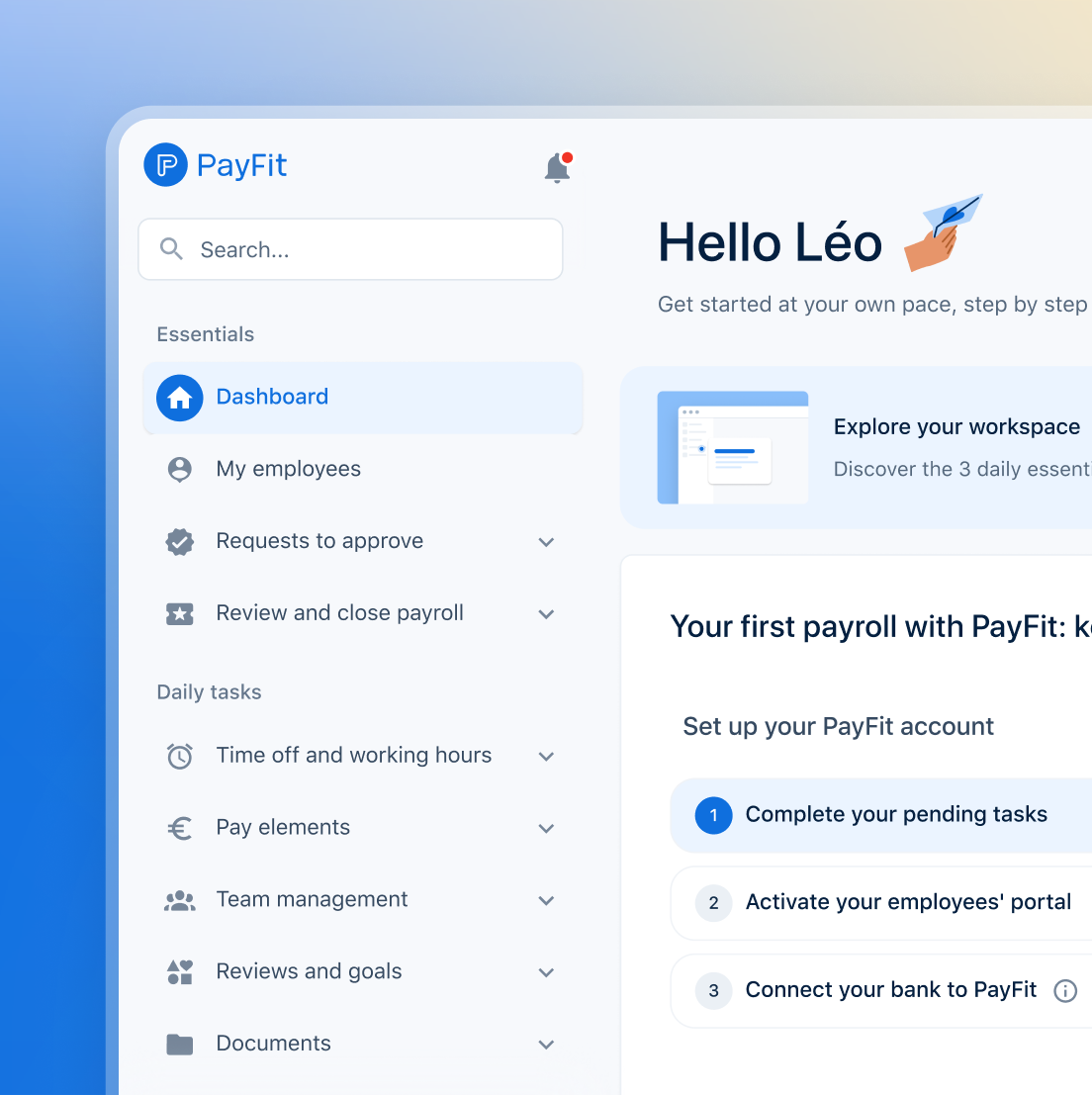✨ Health insurance, now in PayFit - learn more
💷 All the rates & thresholds you need to know for 25/26...right here
✨ The Payroll Journey: Start, Scale & Succeed Globally - learn more
✨ Health insurance, now in PayFit - learn more
💷 All the rates & thresholds you need to know for 25/26...right here
✨ The Payroll Journey: Start, Scale & Succeed Globally - learn more

Overtime pay is any additional compensation for hours worked beyond the contractual working week – but there’s no legal “standard” rate in the UK.
Contracts should spell out whether additional hours are voluntary, compulsory, or taken as time off in lieu (TOIL), and how much (if anything) is paid.
Whatever approach you take, total pay for all hours worked must not fall below the national minimum wage / national living wage.
Working time rules still apply: on average, workers shouldn’t work more than 48 hours a week unless they’ve opted out of this limit (measured over 17 weeks).
Regular additional hours can affect how you calculate holiday pay, so keep clear records to reduce errors, disputes, or a pay-related claim.
Every employment contract should specify the number of hours a person is expected to work; overtime pay is simply the additional compensation people can get for working beyond those hours.
UK rules around extra hours, pay rates, and the latest rulings can get a little complicated to untangle. But it’s crucial that HR leaders, finance managers, and small to medium-sized business owners understand them.
Let’s unpack these elements so you’ve got practical advice you can apply across your company.
Overtime pay is the extra compensation staff receive for hours worked beyond their standard contractual schedule. It’s not just about extra money; it’s about recognising the additional effort employees put into their work. Competitive rates can help an employer attract and retain key workers.
Not really: whether overtime is mandatory depends on the employment contract.
If the contract says additional hours are compulsory, an employer can require employees to work beyond their usual schedule. But this still needs to sit within the legal working-hours limit (an average of 48 hours per week, usually measured over 17 weeks, under the Working Time Regulations 1998), unless the worker has opted out.
Overtime can usually be grouped into a few common arrangements.
This is where people choose to work additional hours at their discretion.
This is where staff are required to work longer hours because their contract says so.
Instead of receiving extra pay, people get the equivalent in paid leave.
You can also get holiday overtime, when employees are paid a different amount on certain days or are given that day off on another day of the year.
Some companies apply different rates on certain days, or offer an alternative day off later in the year.
Overtime arrangements at a glance
| Type of overtime | Who decides? | How is it usually rewarded? | What should employers watch out for? |
|---|---|---|---|
| Voluntary overtime | The worker chooses to work extra hours | Standard rate or enhanced rate (e.g. time and a half) | Make sure total hours and pay still meet minimum wage rules. |
| Mandatory overtime | Set out in the employment contract | Normally paid at the contractual rate for additional hours | Ensure working-hours limits are respected and expectations are clearly communicated. |
| Time off in lieu (TOIL) | Agreed between the employer and the worker | Paid leave instead of extra cash | Track TOIL balances carefully and set clear rules for when it must be taken. |
| Holiday or bank-holiday overtime | Often employer-led (e.g. rota or shift pattern) | Enhanced rate, alternative day off, or a mix of both | Spell out rates and compensatory rest in contracts or policies to avoid disputes. |
Payroll audit guide & checklist
There are no set rates in the UK for work done beyond contracted hours. What’s paid varies widely and will largely depend on the employment contract or collective agreements in place.
While there’s no statutory obligation to pay people more than their standard rate for these hours, many employers offer enhanced rates (like time and a half or double time) to encourage staff to stay on longer.
The main thing to check is that pay for all hours worked always sits above the national minimum wage / national living wage.
No: legally, companies don’t have to pay specific overtime rates unless the employment contract says so.
But even when overtime is unpaid, overall pay for all hours worked must not fall below the national minimum wage / national living wage. That’s a payroll risk (and a potential claim) you’ll want to avoid.
The core rules for additional hours are fairly limited, but they matter.
First, total hours worked shouldn’t exceed an average of 48 hours per week unless the worker has opted out of the limit.
Second, any specifications around rates for extra hours, compulsory work beyond the normal week, and TOIL should be clearly outlined within the employment contract (or a written policy the contract points to).
Finally, if you’re asking for emergency cover, it helps to notify employees in advance and be clear about the impact. People don’t love last-minute changes, and it’s often where disputes start.
Calculating overtime pay in the UK requires a clear understanding of the agreed overtime rates and the number of overtime hours worked.
This is where an overtime pay calculator might come in handy, but you don’t have to build one or go scouring across the internet to find one that will give you straightforward answers. High-quality payroll software can do this for you, ensuring overtime pay remains compliant and is calculated accurately every time.
Regular overtime can affect holiday pay.
A key ruling by the Employment Appeal Tribunal confirmed that overtime can need to be included when calculating holiday pay in some cases. In practice, if someone earns regular additional hours, their leave pay may need to reflect their average earnings (not only basic salary). Keeping clean records of hours worked is the best way to avoid a dispute later.
TOIL (time off in lieu) is an agreement where, instead of receiving extra pay, workers get equivalent paid leave.
It can be a flexible option for both employer and employees, especially in busy periods. The important bit is clarity: define how TOIL is accrued, how it’s approved, and by when it must be taken, otherwise TOIL balances can become a quiet headache over the following weeks.
Yes.
Unpaid additional hours must still comply with national minimum wage rules.
It’s also worth thinking about fairness. If access to overtime opportunities is inconsistent (or decisions aren’t explained), it can lead to complaints and, in some situations, a discrimination claim if workers are treated differently based on protected characteristics under the Equality Act.
Understanding overtime pay in the UK, from the legal framework to calculation and record-keeping, helps employers manage their workforce fairly while staying compliant.
PayFit is designed to help companies streamline payroll processes, including calculating overtime and supporting accurate holiday pay where relevant. If you want more payroll advice, you can explore our other related guides.

Part-time employees shouldn’t be treated less favourably than comparable full-time colleagues. Once they work beyond their normal contracted hours, check what their contract says about rates and make sure pay for all hours stays above minimum wage.
It depends on the role and the travel. Normal commuting usually doesn’t count, but travel that’s part of the job (for example, travelling between client sites during the day) may form part of working time. A clear internal policy helps managers treat similar workers consistently.
If compulsory additional hours are written into the contract, employees are generally expected to work them. That said, an employer still needs to act reasonably, respect working-time limits, and consider health and safety. If refusals are becoming regular, it can be a signal that workloads need reviewing.
It doesn’t have to be, but many companies choose to show extra hours and rates separately. It helps employees understand their payslip and gives employers clearer records if pay is ever queried.
Keep timesheets (or clock-in data), overtime approvals, TOIL balances, and the contract/policy wording used for calculations. This makes it much easier to give consistent advice internally and respond quickly if a worker raises a concern.

Innovative salary advance schemes can boost retention & financial well-being for UK employees. Explore benefits, risks & payroll software integration.

Learn how to work out hourly rates in the UK: convert salary using simple formulas, handle overtime, and stay compliant as you grow.

Explore different types of employee benefits, from statutory rights to discretionary perks, and learn how to build a compensation package to attract top talent.

Understand backdated pay in the UK, from tax & NIC implications to calculating arrears, with updates on the National Living Wage and Employment Rights Bill.

Confused about pro-rata pay? Discover what is pro-rata salary, how to calculate it for your part-time staff & how it impacts benefits and holiday entitlement.

Compare BACS and Faster Payments to find the best UK payroll solution. Learn about processing times, fees & differences to optimise your business banking.

See what's new in PayFit
New features to save you time and give you back control. Watch now to see what's possible